Legal weapon for collective punishment: Syrian laws violate disappeared persons’ property rights


Saleh Malas | Zeynep Masri
The widespread or systematic practice of enforced disappearance constitutes “a crime against humanity,” according to international law. Syrian regime’s forces, however, saw no crime in arresting several of Aya’s family members, whom the State considers “terrorists.”
As if arresting and forcibly disappearing Aya’s relatives was not enough, the Syrian regime’s forces denied the family their right to dispose of their moveable and immovable assets.
Aya’s family members were a few of many people whose rights to property were restricted by several laws and decrees passed by the Syrian regime.
It is needless to say that efforts must remain focused on locating and finding the whereabouts of the detainees and forcibly disappeared, and help them, through legal advocacy, to restore their rights to freedom and life in dignity, should they be alive.
Simultaneously, Syrian and international human rights organizations, primarily the United Nations (UN) must take serious actions to address the fate of the real property rights of detainees and forcibly disappeared Syrians. The protection of these rights against seizure should be integrated into any UN talks on transitional justice in Syria.
In this investigation, Enab Baladi, legal professionals, and human rights defenders talk through a set of laws that created legal grounds for the seizure of the properties of Syrian detainees and forcibly disappeared. Discussed also are the protection mechanisms the families of the victims can adopt to safeguard their property rights.
Enab Baladi communicated with families of persons held incommunicado in the regime’s detention centers. Most of these families refused to share the details of the property rights violations they were subjected to, fearing that the regime might use their accounts against them, as a pretext to seize their assets.
Arrests, enforced disappearances, breached property rights
In 2015, the regime forcibly disappeared ten members of Aya’s family, as it did with many others who protested its rule. Aya, 27 and a former resident of the Sarouja neighborhood, west of Damascus city, lost two maternal uncles and eight close and distant relatives, one of them a woman.
Requesting that her surname be withheld for security reasons, Aya chose to recount to Enab Baladi the stories of her disappeared relatives, recognizing their right to life before anything else.
Aya consented to share the following details in the hope of establishing these people’s rights to property ownership and disposal, which she believes are no less essential than the right to life.
The first of Aya’s uncles was arrested in 2015 while doing his job, distributing fuel oil to households across Damascus’ neighborhoods.
He was arrested for allegedly being a “terrorist,” Aya told Enab Baladi.
Eventually, this uncle of hers became a forcibly disappeared person in the Syrian regime’s detention centers. All the family’s attempts to communicate with him or obtain the slightest idea as to his whereabouts were to no avail, particularly as the regime’s security authorities denied that he was held in any of their prisons or security branches.
With his disappearance, the uncle’s family lost a car he owned too. The car, which the family identified as theirs through the registration plate, was being used by a group of the regime’s security personnel.
The family attempted to get the car back, but they failed because the owner was arrested on charges related to “terrorism,” Aya recounted. The family quiet the idea and gave up on the car.

A checkpoint of the Syrian regime’s security forces, set up close to decimated buildings in Aleppo city— 3 December 2016 (AFP)
Property disposal restrictions
Only a few months passed before Aya’s second uncle, Assa’ad, was arrested. His relatives are convinced he is dead. They believe that they have identified him as one of the persons captured in the smuggled Caesar photographs.
He was arrested for using his detained brother’s fuel distribution vehicle. Before his arrest, the personnel at a checkpoint cautioned him against driving the vehicle because its owner is a “terrorist.”
Aya’s uncle, unfortunately, continued to use the vehicle, and he was subsequently arrested by the personnel of a security patrol. They arrested him near his house and before his family’s eyes.
In 2018, Aya’s mother and aunts tried to sell plots of land they inherited from their parents, but they were not allowed to complete the transactions because “the names of their detained family members were listed as landowners” in these lands’ registration documents.
The attempt to obtain a real property registration record stopped the sale process after one employee of the Directorate General of Real Estate Interests advised them against selling their lands, Aya recounted.
Both detainees’ families were denied access to other official documents; they were not allowed to obtain death certificates for the two detained men because the security authorities refused to acknowledge they were detained.
Consequently, the families sought the courts and filed a suit demanding the right to the detainees’ real property disposal. The judge, in charge of the case, said that the case was not within his powers and that “it should be overseen by other security entities,” Aya added.
How is arrest different from enforced disappearance
According to Amnesty International, an arbitrary arrest is the detention of persons for no legitimate reason or without legal process.
The UN International Convention for the Protection of All Persons from Enforced Disappearance aims to prevent enforced disappearance, which under certain circumstances the international law defines as a crime against humanity.
Article 2 of the Convention defines enforced disappearance “as the arrest, detention, abduction or any other form of déprivation of liberty by agents of the State or by persons or groups of persons acting with the authorization, support or acquiescence of the State, followed by a refusal to acknowledge the deprivation of liberty or by concealment of the fate or whereabouts of the disappeared person, which place such a person outside the protection of the law.”
Under Article 3 of the Convention, each State Party shall take appropriate measures to investigate acts defined in article 2 committed by persons or groups of persons acting without the authorization, support or acquiescence of the State and to bring those responsible to justice.
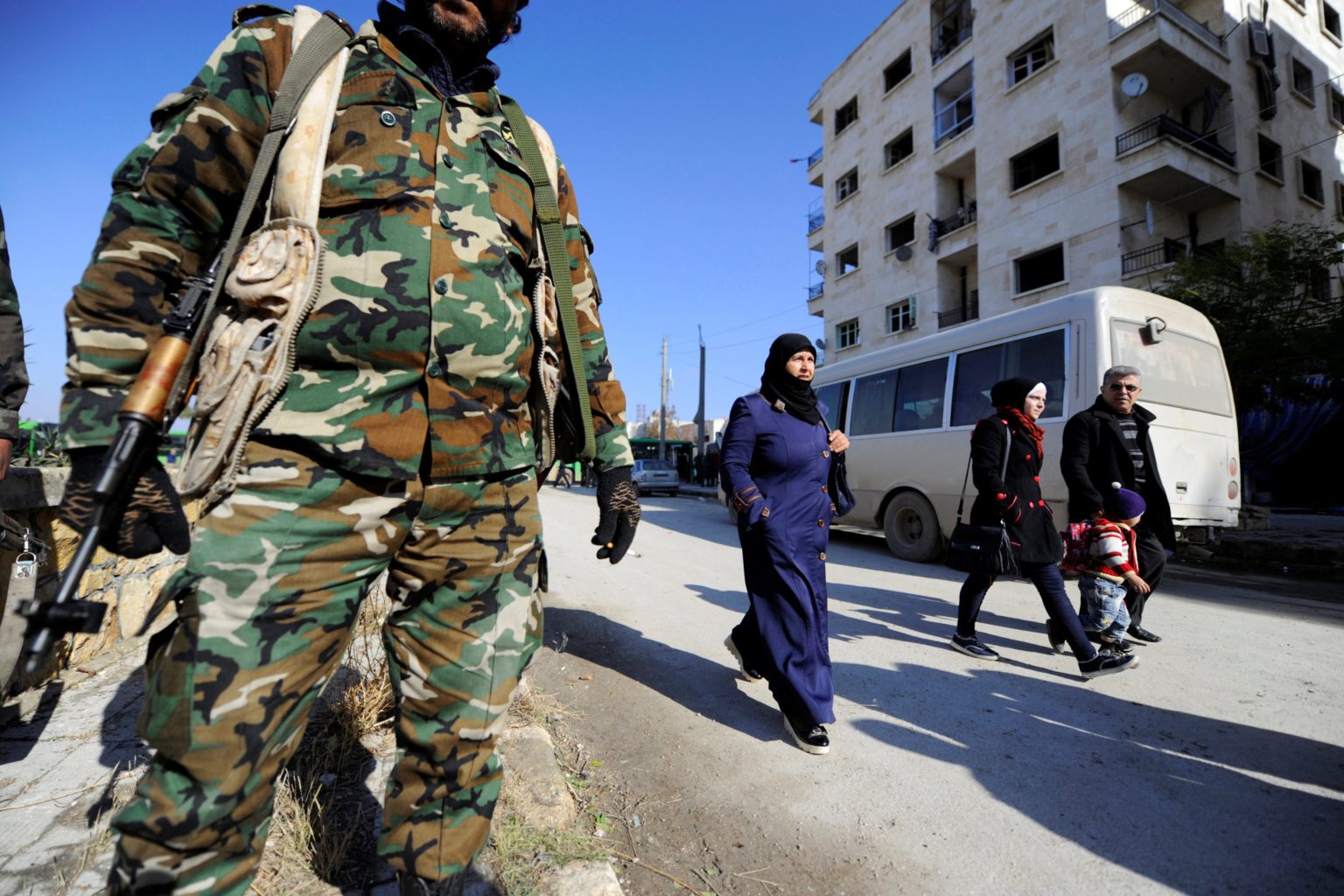
People heading to check on their houses in the Ibrahim Hananu neighborhood, Aleppo city, in the presence of Syrian regime’s forces— 4 December 2016 (Omar Sanadiki)
Counter-Terrorism Laws:
used to violate, not protect, detainees’ rights
There are two dimensions to the relationship between detainees and forcibly disappeared and real property rights. The first has to do with detainees, whose cases are mostly transferred to the Counter-Terrorism Court (CTC). This means that their assets, moveable or immovable, will be confiscated once they are convicted.
The second has to do with the forcibly disappeared, whose families, often women members, are denied real property disposal rights because the detainees’ fate or whereabouts continue to be concealed by authorities.
In April 2011, the Syrian regime decided to tighten the security measures under the declared state of emergency and to abolish the Supreme State Security Court (SSSC).
In July 2012, the regime passed the Counter-Terrorism Law No. 19. In the same month, the President of the Syrian regime, Bashar al-Assad, ratified Law No. 20, which provided for establishing the exceptional CTC.
Under Law No. 19, the Attorney-General is entitled to order freezing real property owned by persons charged with “terrorist offenses,” or any other unlawful acts that the law considers as crimes.
Article 12 of the Counter-Terrorism Law states that “In all acts, defined as crimes by this law, the court, on account of conviction, shall order the confiscation of the movable and immovable assets, their revenues, objects used, or prepared to be used to commit the crime. The Court shall also order dissolving the terrorist group; if such a group exists.”
Real property confiscation rulings were made against thousands of people in Syria pursuant to this article, Syrian lawyer Ahmed Sawan told Enab Baladi.
“The real property, however, is not sold until the guilty verdict is deemed irrevocable,” lawyer Sawan said, for the real property of detainees and disappeared persons are not subjected to these provisions unless a guilty verdict is leveled against the persons charged with offenses. The detainees and the disappeared maintain ownership rights over their property, and their families enjoy disposal right till the persons are convicted and the confiscation orders are passed.
In some cases, the security authorities and services deliberately mark the names of the people charged with such offenses. This “security mark” is used to ensure that these persons would not be able to conduct any real property transfers in the future and that the regime will be able to confiscate their real property when a guilty verdict is leveled.
The decision of precautionary seizure is passed against the convicts by the Minister of Finance at the request of the Public Prosecutor’s Office of the CTC.
Following the precautionary seizure, the court rules with confiscation and orders its enforcement. It then sends an official letter to the Administration of State Property of the Ministry of Agriculture. The Administration then communicates the court decision to the Cadastral Office to transfer the ownership rights from the convicts to the Syrian Arab Republic. Finally, the Administration of State Property evacuates the real property and hands it over to the State through the police.
The real property is sometimes sold at a public auction, and the price obtained is deposited at the Syrian State Treasury, Lawyer Sawan said.
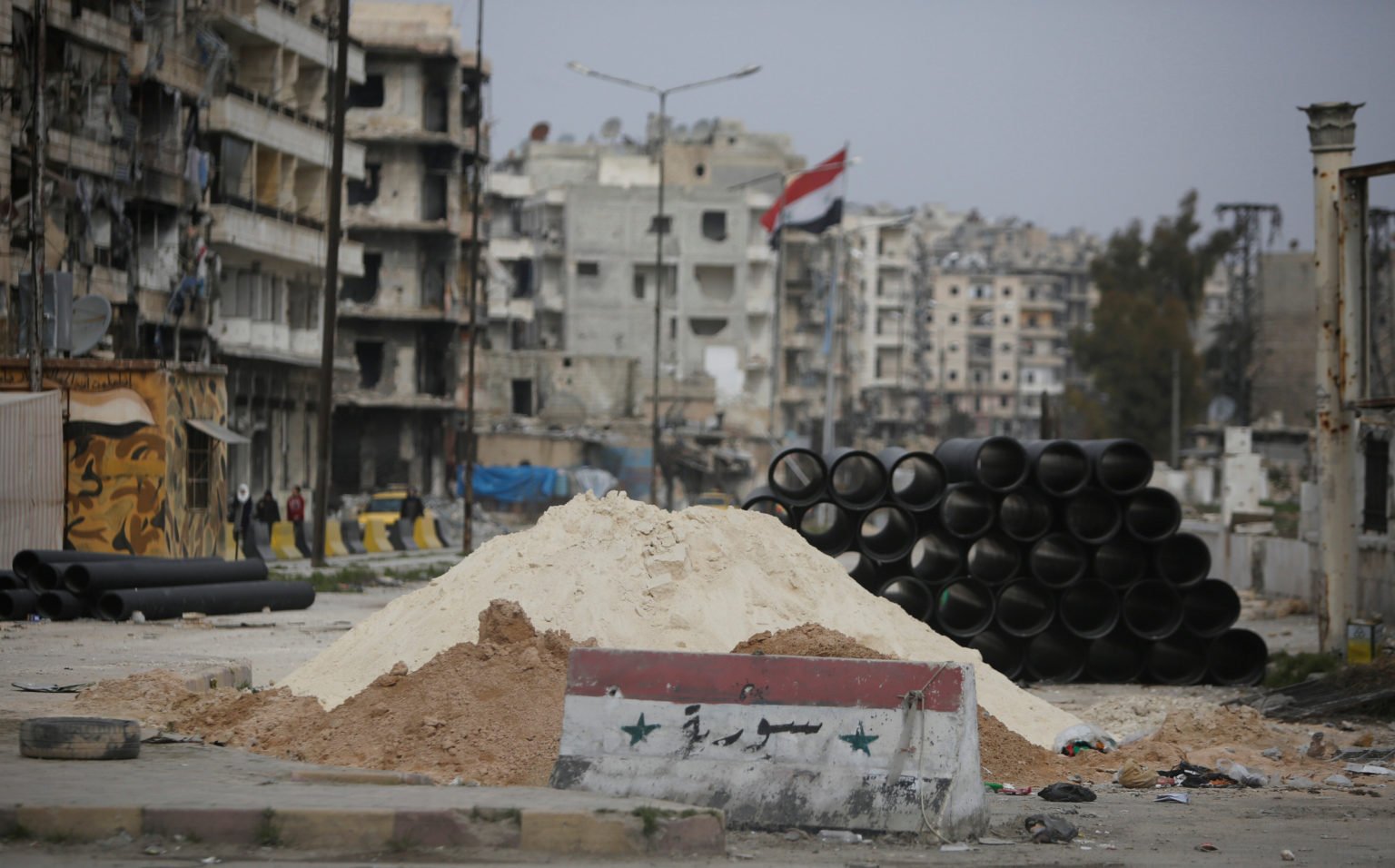
A checkpoint of the Syrian regime’s forces in a neighborhood in Aleppo city — 8 February 2018 (Reuters)
Confiscation, precautionary seizure, and freezing assets
Article 1 of the Counter-Terrorism Law defines confiscation as the “permanent deprivation of moveable and immovable assets and the transfer of their ownership to the State by a court ruling.”
This definition is all-pervasive and all-encompassing of movable and fixed assets, whether used to commit a crime or not. That is the penalty is aimed at the person involved, but not the offense.
The precautionary seizure is “destraining the debtor’s money by the judiciary to prevent the debtor from engaging in any legal or fiscal activities that might lead to losing the money or its revenues constituting the specified total amount to be paid to the creditor, who applied for the precautionary seizure.”
In relation to the detainees’ assets measures that the CTC adopts, a precautionary seizure is ordered to safeguard the rights of people harmed by terrorism-related crimes should the people charged with these crimes be found guilty. The seized assets are thus considered as compensation for the State or persons affected by these crimes.
The precautionary seizure is not an executive measure, but rather a preventive one, enforced only after the creditor obtains an executive order against the debtor. A precautionary seizure is usually imposed on the debtor’s movable and immovable assets.
According to the Counter-Terrorism Law, freezing of assets is “prohibiting the disposal of, exchange, transfer, or changing the form of movable and immovable assets for a specific period or during pending investigation and trial,” as defined by the anti-terrorism law.
| Notification procedures harming fair trial
In the detention centers, the accused/detainees are informed of the court’s ruling orally, and rarely in a written form, provided with a copy of the verdict, which they are ordered to sign. Many former detainees reported that a number of the convicted persons were forced to provide their fingerprints on the verdict copy while blindfolded, uninformed of the contents of the document. In other cases, convicts were not even informed of the verdict, whereby the court’s deceleration of the verdict at the courtroom is considered a sufficient declaration, lawyer Ahemd Sawan said. |
Counter-Terrorism Court:
judiciary at odds with fair trial
The Counter-Terrorism Court (CTC) was established under Law No. 22 of 2012, which provided for forming a court to oversee the terrorism cases articulated in the Counter-Terrorism Law; the CTC is based in the capital Damascus.
The law also stipulates that additional courtrooms could be established when necessary.
The CTC is run by three judges, appointed by the President of the Republic, after considering the recommendations made by the Higher Council of the Judiciary, which the President himself heads.
According to the study “Conflict Resolution Mechanisms,” conducted in 2020 by the Syrian judge Khaled Al-Helou, who investigated the real property problem in Syria, the President of the Republic also appoints the prosecutor and the investigating judge. However, a referral judge is not assigned to this court, and this does not correspond to the “due process” of the Syrian Penal Code No. 112 of 1950.
Moreover, the rulings of this court are reversed only by a decision from a special body of the Court of Cassation. This body is formed exclusively through a decree. In the case of judgments in absentia, the CTC does not approve the appeal by way of retrial unless the convicted person voluntarily surrenders, and this is also contrary to the “due process” of the Syrian Penal Code, which considers the judgment in absentia null as soon as the accused has voluntarily surrendered, or is arrested.
The CTC, according to the study, does not adhere to the principles stipulated in the legislation in force, in all the stages and procedures of prosecution and trial.
The law establishing the CTC did not distinguish between civilians and militants, nor between adults and juveniles, which are all tried equally. This is an infringement of the Criminal Procedure Code, the Juvenile Delinquent Law, and the jurisdiction of juvenile courts, according to the study.
The provisions providing for establishing the CTC affect the due process’ integrity and fair trial.
The majority of detainees in Syria have been judged guilty by this court. Therefore, their properties are subject to the provisions of the Counter-Terrorism Law. This also applies to a large number of those tried in absentia, who are either in hiding inside Syria or are abroad.
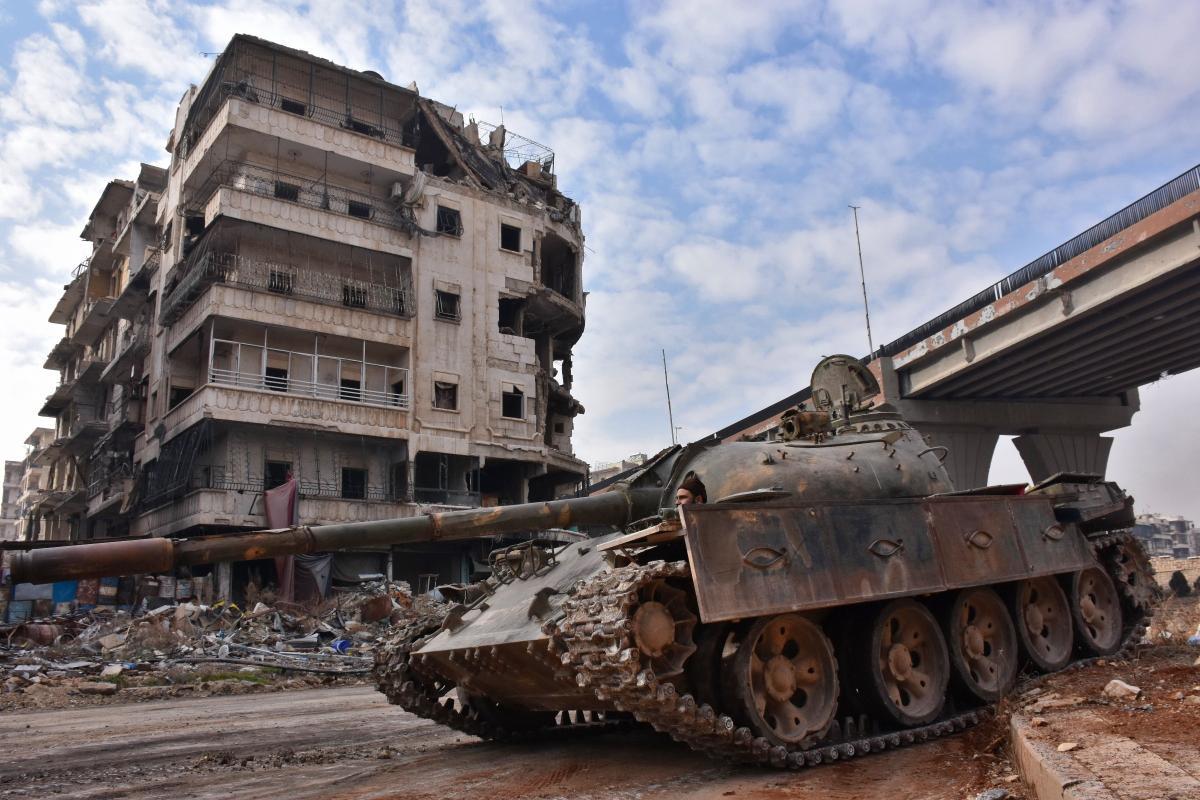
A tank of the Syrian regime’s forces in al-Sakhour neighborhood, Aleppo province—7 December 2016 (George Ourfalian)
Wide powers:
security forces violating detainees’ property rights
Under Legislative Decree No. 63 of 2012, the judicial police, during investigations of the crimes committed against the internal and external security of the State, as well as crimes listed by the Counter-Terrorism Law, are entitled to address the Ministry of Finance in writing, and to request the necessary precautionary measures to be imposed on the movable and immovable funds of the accused persons, Ghazwan Kurunful, Syrian lawyer and head of the Free Syrian Lawyers Association, told Enab Baladi.
While overseeing a case, the Public Prosecutor’s Office and the investigating judge are also granted the right to take such measures against the accused or the defendant, including travel bans, until an irrevocable court ruling is made, Kurunful added, saying that this gives the judicial police– regular police and security personnel– the power to request the seizure of the money and property of the person under investigation.
According to Human Rights Watch, the expansive reach of Decree No. 63 shows how threatened the Syrian government feels by the mere expression of humanitarian activism and dissent.
The decree also contradicts the regime’s stated intent of encouraging Syrians who fled the war to return to Syria. By widening the scope of the decree to arbitrarily punish families of people who may be charged or prosecuted, the government is signaling to the families that they too are at risk.
Decree No. 63 also represents one of the “tools of personally motivated revenge against detainees and collective punishment of their families,” lawyer Kurunful said, as it contravenes the Syrian Constitution of 2012, due to its violation of the property right, which is safeguarded by the constitutional text.
The decree also violates the general Syrian laws because the due process entails that provisional measures should be ordered by a court, not by the security services, Kurunful added.
The case being thus, it is also assumed that the measures are ordered by a court that enjoys impartiality and independence, which order is not irrevocable, but is subject to the methods of appeal stipulated by the law.
There were 40,000 cases of precautionary seizure of movable and immovable assets of Syrians in 2017, and 30,000 in 2016, most of these were enforced against persons who the regime describes as “involved in terrorism-related offenses.”
In September 2019, the Assistant Minister of Finance of the Syrian regime, Bassam Abdul Nabi, declared that since the beginning of the year precautionary seizure was enforced against movable and immovable funds of 10,315 persons.
Disappearance of persons is not an excuse to take over their assets
According to Article 31 of the Syrian Civil Code, the legal personality of a person is established since birth, effective while alive or dead, when actually dead or declared dead by a court ruling. Persons regarded as missing or disappeared lose their right to property disposal owing to their absence or disappearance.
A missing person is a person who has disappeared and whose location or conditions are unknown, according to Article 202 of the Syrian Personal Status Law.
The provisions regarding missing persons apply to a large number of Syrians forcibly disappeared, missing, and detained in unknown locations, or those whose death has not been confirmed.
A missing person remains in possession of his assets until a judge declares him dead, Ahmed Sawan said. Missing persons are also subject to legal effects that stipulate that the involved person be alive, including his right to inheritance.
The judiciary allows a relative of the missing person to apply for a power of attorney on behalf of this person. The application is filed to the Sharia judge, attached to the following documents: a civil registration extract for the two parties obtained from the civil registry department, a summary of the legal record of the person to be granted the power, in addition to a certified copy of the police report on the missing person, along with testimony from the al-Mukhtar, in which he gives the personal details of the missing person and confirms that he is missing, according to Sawan.
The Sharia judge issues the power of attorney shortly after the application and following simple procedures. This power preserves a missing person’s rights to property disposal as long as the court has not declared him dead.
When the missing person’s death is confirmed, a document of the settlement of succession is obtained, to allow the distribution of his property to heirs.
A specific age is usually set up by the law, after which the missing person is declared dead by the court, even if evidence of his death is not provided. This age varies across different legal systems.
According to Article 205 of the Syrian Personal Status Law, the court is entitled to declare dead a missing person once he is 80 years old unless the reasons or circumstances that led to his disappearance are of a military character. In the latter case, the person involved is declared dead or alive not by virtue of overwhelming evidence but based on the likelihood of death.
Should the person go missing due to military action, or similar situations that are considered fatal, the court is entitled to declare that person dead after four years from his disappearance.
Three hypotheses
At times, the missing person, declared dead by the court, might reappear. When a person is proven alive, the death ruling then becomes inconsistent with reality. Three hypotheses govern the legal approach to defining the said person’s legal status, listed below and explained by lawyer Kurunful:
Alive, but in an unknown location
This hypothesis applies to the so-called absent person, who has been proven alive, but his exact whereabouts are unidentified. An absent person is thus different from a missing person, “for every missing person is absent, but not every absent person is regarded missing.”
The movable and immovable assets of an absent person are managed and overseen by a person with a power of attorney to safeguard the interests of the absent person himself or the interests of others.
If a person is authorized by a power of attorney granted by the absent person himself before he went missing, the holder of the power of attorney is deemed a trustee by the relevant court as well, and should meet the conditions that guarantee he will preserve the missing person’s property.
When such a trustee is not appointed, the court appoints one, called a legal trustee.
In light of this, the trustee shall take all measures to preserve the absent person’s assets, including real property, except for those confiscated under a court ruling, for the trustee cannot take any actions in this regard.
The person is dead, but there is no evidence of his death
According to Article 205 of the Personal Status Law, the status missing ends by the return of the missing person, his death, or when a court declares him dead when he is 80 years old.
Consequently, a property’s stakeholders can resort to the court, demanding a legal death declaration after four years of the missing person’s absence. The person is then registered legally dead at the civil registration department. What follows is a process of obtaining a document of the settlement of succession and the distribution of inheritance. The wife, starting from the date of the death ruling, is considered a widow.
Released detainee, however, incapacitated due to torture
Article 115 of the Syrian Civil Code considers insane persons incapacitated, and therefore any activities of property disposal are considered null in case they happened before his disqualification ruling and its publicization, but if the property-involving action was carried out before the ruling is made, then it is null only in tow cases, if the state of insanity was clear at the time of the activity, or the other party to the disposal activities was aware that the person is incapacitated.
An incapacitated person is assigned a guardian of himself and his assets. The guardian manages and disposes of these assets, only if the disposal activity is absolutely beneficial to the incapacitated person, namely, when a loss is unlikely. All the guardian’s actions are supervised by the court and are subject to its approval, or rejection.
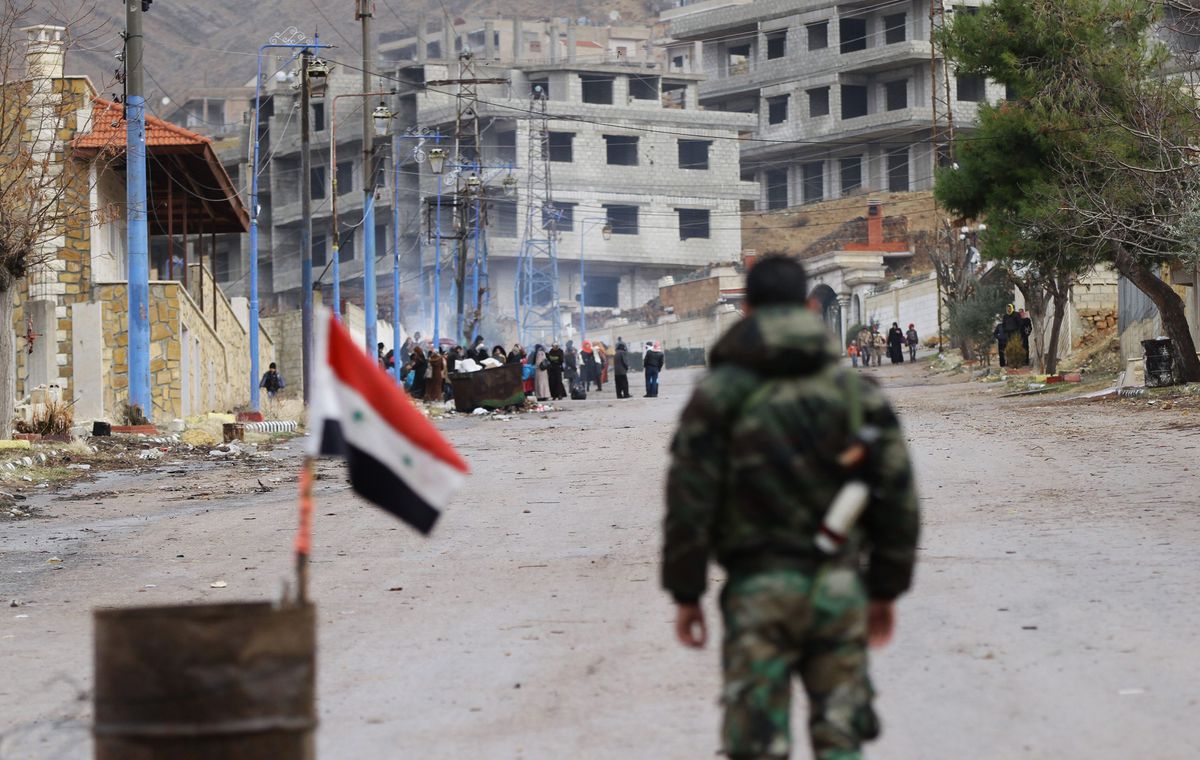
A member of the Syrian’s regime forces at a checkpoint at the entrance to the town of Madaya, Damascus countryside – 14 January 2016 (Louay Bshara / AFP)
No constitutional control over the real property laws in Syria:
How to defend rights?
The existing Syrian Constitution of 2012, particularly Articles 15, 16 and 17, protects the individual’s right to property, and this protection is reinforced by the Syrian Civil Code and the Planning and Urban Development Law No. 23 of 2015.
The articles of the Counter-Terrorism Law are all inconsistent with the Syrian Constitution. Article 12, for instance, provides that “In all acts, stipulated as crimes by this law, the court, on account of conviction, shall order the confiscation of the movable and immovable assets, their revenues, objects used or prepared to be used, to commit the crime. The Court, [CTC], shall also order dissolving the terrorist group; if such a group exists.”
This article is often criticized for being absolute and for covering all assets and revenues, whether used to commit the crime or not, which makes it contrary to the constitutional text of Paragraph 1/a of Article 15.
Laws inconsistent with the constitution are null and non-existent, and the judge can refrain from applying them automatically due to their violation of the general system, or by arguing that the law is unconstitutional.
Likewise, a court ruling based on a law that violates the constitution does not grant legitimacy to the law and is considered non-existent per se.
Moreover, the CTC is an exceptional and unlawful court. Its establishment is considered an assault on the judicial authority and a violation of the provisions of the Constitution, which limits action before the court to regular courts, that have fair trial guarantees in terms of procedures and the right to defense.
There is no constitutional oversight of real estate laws in Syria, Sara Kayyali, Syria researcher in the Middle East and North Africa Division, told Enab Baladi.
There are procedural laws related to real estate dispute resolution mechanisms; but still, the right to property restitution is not safeguarded in Syria, because there are no constitutional determinants that ensure a guaranteed mechanism for the separation of powers, or the reform of the judiciary and its independence from the executive authority, Kayyali added.
Under Law No. 7 of 2014, which regulates the work of the Supreme Constitutional Court, the court is nothing but a “tool at the disposal of the President of the Republic, since the latter is the one who appoints its members, and this matter is certainly very dangerous,” according to a legal research paper on real estate ownership and the Syrian constitution, published in 2020 by the Free Syrian Lawyers Association.
One of the court’s preliminary tasks is monitoring the compatibility of laws and legislative decrees with the text of the Constitution.
The research paper recommended that a constitutional provision be added, stipulating for stopping the enforcement of real property laws that deprive people of or restrict their access to ownership rights, as well as the laws that allow property confiscation and seizure, such as the Counter-Terrorism Law.
A lawyer practically cannot make a meaningful step to protect his client’s property that is confiscated under Counter-Terrorism Law, for several reasons, lawyer Ghazwan Kurunful said.
The most important of these reasons is that the court hearing the case is an exceptional court, which is exempted from following legal principles and due process of the Criminal Trial provided by the enforced legislation, in all the roles and procedures of prosecution, interrogation, and trial.
The violation of detainees and forcibly disappeared property rights in Syria is not considered a breach of human rights, because the political struggle is between the Syrian regime and its opponents only. However, these violations are a threat to post-conflict social stability, lawyer Ahmed Sawan said.
Accordingly, Syrian and international human rights organizations should anticipate expropriation and ownership disputes in the country, given that a large number of people have lost the right to dispose of their real property as a result of the Syrian regime’s enforcement of the CTC’s law and the Counter-Terrorism Law.
The UN continues to be passive, as it has not been using its legal or political tools to press the Syrian regime to stop enforcing laws that deprive detainees and forcibly disappeared persons of their property rights, Sara Kayyali said.
if you think the article contain wrong information or you have additional details Send Correction
النسخة العربية من المقال
-
Follow us :
Most viewed
- Turkey moves to deploy air defense system in Syria
- Intentions for popular resistance amid Israeli escalation in southern Syria
- Washington's conditions raise questions about its openness and goals in Syria
- SDF to withdraw from Aleppo neighborhoods following agreement with Damascus
- Syrian returnees celebrate first Eid after liberation

















 A
A
A
A
A
A
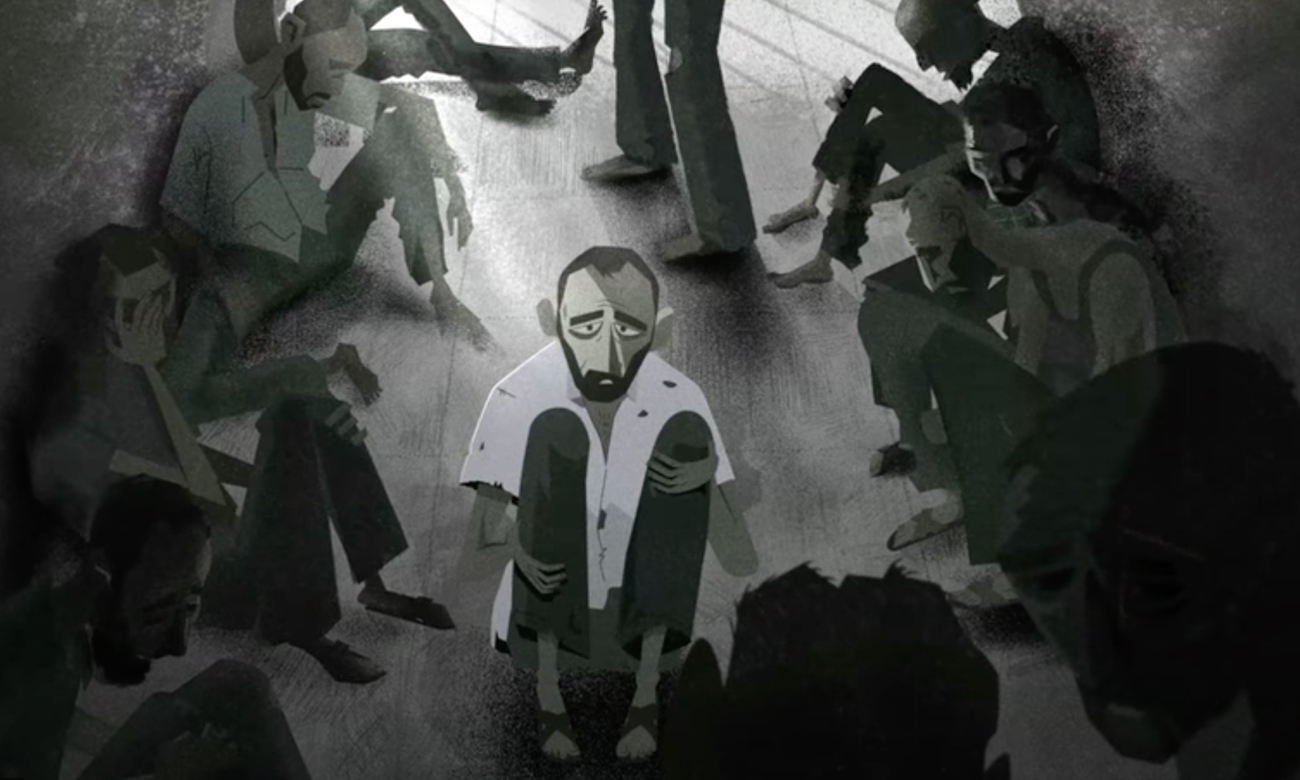


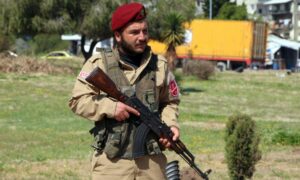

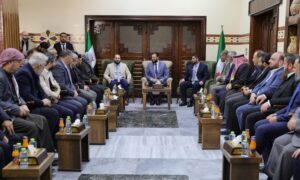

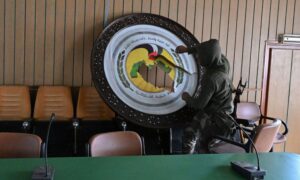
 More Investigations
More Investigations